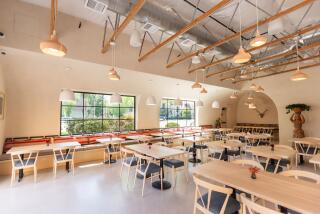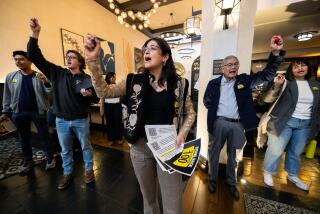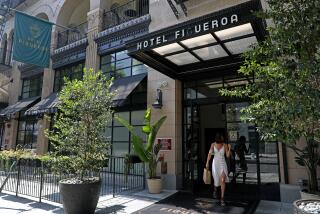150 cannery workers are in forced quarantine at L.A. hotel without pay, suit claims
About 150 seasonal employees hired to work at a salmon cannery in Alaska are instead being forced to quarantine without pay at a hotel near Los Angeles International Airport after three of them tested positive for the coronavirus, a lawsuit claims.
The workers, most of them from Mexico and Southern California, were hired June 2 by North Pacific Seafoods to work at its Red Salmon Cannery in Naknek, Alaska, through August, according to the lawsuit filed Friday in San Francisco Superior Court.
Instead, they’ve been stuck at the Crowne Plaza LAX Hotel since June 10, attorney Jonathan Davis said Saturday.
“Tomorrow is Father’s Day,” Davis said. “I have two young sons, and I’d be sick to my stomach if I knew one of my children was being held in this type of situation.”
Leauri Moore, vice president of human resources for North Pacific Seafoods, said in an email that she had not seen the lawsuit and could not comment on the specifics.
Moore said authorities in Alaska have issued orders requiring a 14-day controlled quarantine and coronavirus testing in order for anyone to work at a seafood processing plant in the state, and that the company has been working with health professionals to ensure compliance with the orders.
“I’ve worked in the Alaska seafood industry for 30 years and the challenges this year are like nothing we have faced in the past,” Moore wrote. “We are in the middle of a worldwide pandemic, and are doing what we can to ensure the continuation of the worldwide food supply chain while also ensuring the safety and health of workers, Alaskan residents, and the Indigenous people in the Bristol Bay watershed.”
A spokesman for Intercontinental Hotels Group, which owns the Crowne Plaza LAX and is also named in the lawsuit, said Sunday that the company does not comment on pending litigation, but that it prioritizes the health and safety of guests and employees. .
“We want to stress that the hotel did not prevent any guest from freely leaving the property and provided safe and comfortable accommodations to the guests, including three meals a day,” Jacob Hawkins, the spokesman, wrote in an email.
Based in Seattle, Pacific Seafoods each summer hires hundreds of workers from around the world for temporary jobs at its Naknek cannery, promising them round-trip transportation to and from their point of hire as well as lodging and meals.
Dozens of workers were directed to the Crowne Plaza LAX to be tested for the coronavirus ahead of the canning season, according to the lawsuit. They were told they would quarantine there for four days while awaiting test results and then fly via charter to Alaska to start work, the complaint states.
Once the workers arrived at the hotel, they were instructed to wait together in a crowded hallway and fill out paperwork using shared pens, putting them in close contact with one another for up to six hours, the lawsuit alleges.
They were then assigned individual rooms, where they received coronavirus tests.
That’s when the hotel deactivated their key cards to ensure they couldn’t come and go, the complaint states.
Four days later, when results came back positive for three of the workers, all 150 were told that their quarantine had been extended 11 days, until June 25 and that they would not be paid for the time, the lawsuit alleges. They were warned that if they left their rooms for any reason they’d be immediately fired, the complaint states.
Many of the workers were effectively stranded, leaving them with no choice but to comply, Davis said.
“If they left, they’d be at the LAX airport high and dry,” he said. “They wouldn’t have any pay for the time they were there, and no promise from the company that they’ll be transported back to where they came from.”
Since the start of the initial quarantine June 10, the hotel has provided the workers with no more than two meals a day, according to the lawsuit. In addition to being prohibited from leaving the premises to get additional food or supplies, they’ve also been barred from ordering room service or accessing any hotel services, the complaint states.
“They’re mostly young people. They’re away from home,” Davis said. “I think it’s fair to say that English is not their first language, so they’re in a foreign country or foreign environment. … They’re all worried and preoccupied about what is happening and what is going to happen.”
He described the situation as “bizarre and outrageous,” even when it comes to the treatment of seasonal workers, who are often vulnerable to abuse.
“There are certainly many, many horrible stories in the history of labor and migrant workers and seasonal workers in the United States, but I have not seen this type of case before,” he said.
On the fifth day of confinement, the lawsuit claims, North Pacific Seafoods left a note at each worker’s room that read, “I know this is not what you expected but given the circumstances we appreciate your patience. Every third day you will receive a snack bag to cheer you up.” It was signed with a smiley face emoji.
“North Pacific provided no compensation or remuneration beyond the occasional snack bag in exchange for confining its employees without pay,” the complaint notes.
The lawsuit alleges false imprisonment, nonpayment of wages, failure to pay minimum wages and overtime, negligence and unlawful business practices. Attorneys plan to go to court next week and seek a temporary restraining order to have the workers immediately paid, Davis said.
If the court finds that all 150 workers are owed pay for 14 days of quarantine, the compensatory damages for lost wages could top $1.1 million, he said.
“The bottom line is: We all want people to be able to work in healthy and safe environments, and we all want to mitigate the possible spread or exposure to COVID,” he said. “But … if you’re going to open the doors and do business, you’ve got to take care of the people who are going to make your business work.”
More to Read
Sign up for Essential California
The most important California stories and recommendations in your inbox every morning.
You may occasionally receive promotional content from the Los Angeles Times.











